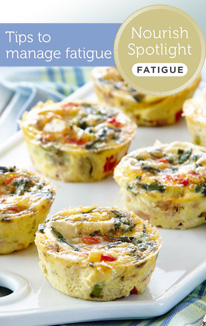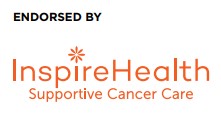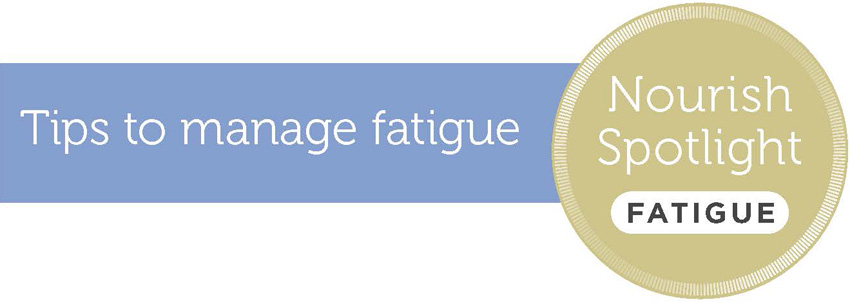
Download Nourish Spotlight:
FATIGUE – Tips to manage fatigue (PDF)
Cancer-related fatigue is different from the regular fatigue everyone experiences from time to time; it is usually more severe, lasts longer, and can make it hard to get through your daily activities. Resting more or doing less does not make it go away. Here are some tips that may help to reduce fatigue:
✓ FUEL UP AT REGULAR INTERVALS. Eating every few hours gives your body a constant source of energy.
✓ INCLUDE A SOURCE OF CARBOHYDRATE AND PROTEIN WITH ALL MEALS AND SNACKS. Eat energy-dense and protein-rich foods for longer lasting fuel for your body. Ask your healthcare team about meeting with a registered dietitian if you have trouble eating enough and/or are unintentionally losing weight.
✓ STAY WELL HYDRATED. Aim for at least 6 to 8 cups (1.5 to 2 L) of fluids every day.
✓ SEE HYDRATION TIPS CARD for ideas on how to stay well hydrated.
✓ STAY ACTIVE. It’s been proven that exercising regularly is the best strategy to help reduce cancer-related fatigue. A good exercise program includes three types of activity. BOX 1 BOX 2

Spinach Frittata Muffins
Ingredients
• 4 eggs
• ¼ cup diced red onion
• ¼ cup diced red bell pepper
• ½ cup chopped spinach
• 6 cherry tomatoes, cut in halves
• ½ teaspoon dried rosemary
• 2 tablespoons grated cheddar cheese
• ½ teaspoon olive oil
• Salt and pepper to taste
Preparation
1. Preheat oven to 375°F
2. Crack the eggs into a bowl and whisk them
3. Add onion, bell pepper, spinach, tomatoes, rosemary and cheese to the eggs and season with salt and pepper
4. Grease 6 muffin cups with cooking spray or use liners.
5. Distribute the egg mix among 6 compartments.
6. Bake for 10–20 minutes or until the eggs are set. Store leftover muffins in the fridge for a few days or freeze them. Reheat in oven or microwave.
Links to patient resources
How to manage fatigue
About cancer-related fatigue
AUTHORS
Megan Morrison RD, Princess Margaret
Cancer Centre, Toronto, Ontario
Stéphanie Pasaman RD, University of Montreal Health Centre (CHUM),
Montreal, Quebec
Erin Roman RD, InspireHealth Supportive
Cancer Care, Vancouver, British Columbia
DISCLAIMER
The information in this publication is not intended as medical advice nor should it replace advice, expertise and information given by a member of your healthcare team.
Nourish Spotlight is a publication of the Nourish: Canada’s Nutrition Companion for Oncology Patients and Caregivers series: a free resource developed by registered dietitians, available in print and online www.nourishonline.ca

Made possible through an educational grant provided by





Comments are closed.